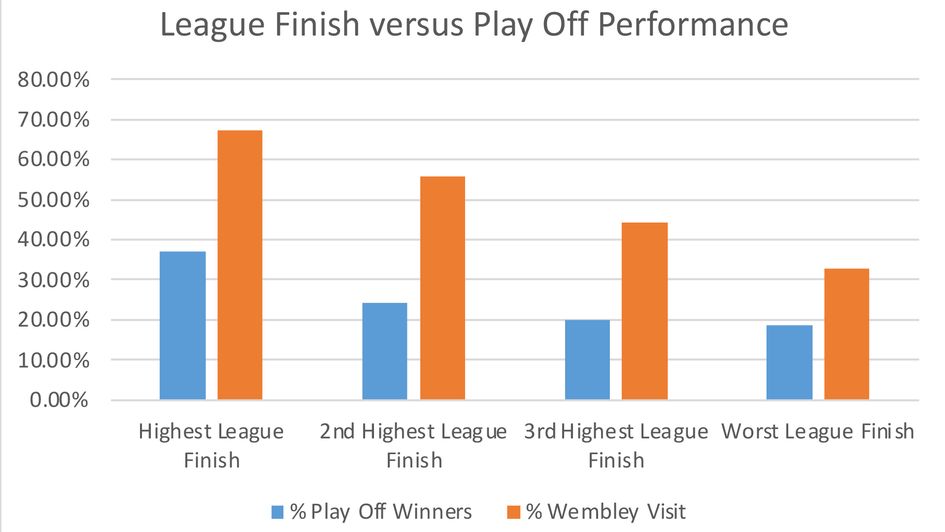@StattoBets has worked in the betting industry for more than 20 years, and been a contributor to Sporting Life since 2001. More recently, Dave’s work can also be read at www.bettingemporium.com
Football often sees repetitive narratives emerge season after season in a seemingly endless cycle. This column sets out to debunk or confirm these recurring clichés.
As the domestic season reaches its climax each year we see two completely conflicting sets of opinions.
The first group comprises those who attempt to predict who will cope with the challenge of the play-offs most effectively – courtesy of their league finishing position, their end-of-season form or prior experience in the dreaded event.
The second group cast aside any such science and simply declare the play-offs are a lottery.
So who really is right?
To address this, I've investigated whether applying certain metrics has a discernible impact on predicting the eventual winners.
For this study, I have used every set of play-offs from the EFL since the 1999/2000 season – the season when away goals were finally abolished. I excluded the L1 and L2 play-offs from the COVID-affected season as the entry criteria was different. This leaves us with 70 sets of play-offs, comprising 140 finalists and 280 teams in total.

The league table doesn't lie
It follows that the better-performing sides finish higher in the table and should feel confident heading into the play-offs. Were that the end of it, then there wouldn’t be much point in the play-offs at all would there? So how does it actually affect things?
Across the three divisions, over nearly a quarter of a century, the side finishing highest in the table have won 26 of the 70 play-offs – a very healthy 37.1%.
They have also reached the final on no fewer than 47 occasions – suggesting your average third place finisher (fourth place in League Two) would have a 67% chance of progressing from the semi-finals.
Qualification for the final correlates almost perfectly with league position in fact:


Goal difference also a good indicator
If finishing higher in the league is advantageous, what about being the best team – identified as the best goal difference over the duration of the season? (Where sides have achieved the same goal difference, I have simply split the result evenly across two finishing positions).
Well, the side finishing the season with the best, or joint best, goal difference went on to win the play-offs in 21 of the 73 trials (31%) and reached the final in 42 renewals (58%). Again, there is a strong correlation.


It’s pretty compelling, although not as marked as the league finish.
Logic suggests this is almost certainly down to the third place finisher facing the sixth place finisher in the semi-finals and hence why they have a better record of reaching the final when looking at their finishing positions.
Momentum, momentum, momentum
This one is well-debated. Momentum gives sides confidence, and confidence wins games, right?
I’ve heard plenty of Leeds fans bemoaning their chances should they end up in the play-offs because they’ve only picked up four points from a possible 15 going into the final weekend.

Would you rather finish in sixth place, having picked up 18 points from your last six matches, or third, having only won once in the last six?
It certainly makes sense, until we consider how that momentum value could be cast aside as a team well inside the play-offs might rest their key men in the last couple of games of the regular season.
Perhaps that rest, regardless of an interruption in momentum, would benefit them?
The results are inconclusive on this particular test, however.


Over our sample period, 25 sides have gone into the play-offs having collected 15pts+ in their final six games. Only six have been promoted despite carrying that sort of form into proceedings.
While there appears some correlation with better form and winning promotion, it appears very weak, while the chances of actually reaching Wembley appear unaffected by form entirely.
It’s interesting to note that sides ending the season in form, and who did make it to the final, had a very good record once there but the samples are too small to draw any meaningful conclusions.
Is previous play-off experience important?
I’ve made a basic assumption here – that squads rarely stay together for more than a couple of seasons.
For simplicity, I’ve broken all participants into two groups. Those who played in the play-offs the previous season, and those who did not. The hypothesis is that playing in the play-offs the prior season should, in theory, be an advantage.
So, to the numbers - 60 of the 280 clubs who have participated over the past 24 seasons had been involved in the play-offs in the immediately preceding season. Of those, 31 went on to reach the final, and 29 did not.
Pretty clear therefore that experience counts for little. Although, that said, 20 of them did go on to win it – a 33% strike rate. Inconclusive.

Putting it all together
Finally, I analysed the performance of sides who fulfilled all three criteria - namely attaining the best league position, registering the best goal difference (or joint best) AND finishing the season in the best form.
Only 17 teams over the past 24 seasons matched that criteria, with nine going on to win it (53%) and 11 reaching the final (64.7%).
So, the next time your friend turns to you and declares “the play-offs are a lottery”, hopefully you are now armed with some solid info to show that’s simply not the case.
The play-offs are an extension of the regular season, and whilst we could argue their merits all day long (interest factor versus sporting merit), the fact is they simply are not a lottery.
Long-term season performance is the strongest predictor of success once the action unfolds, with sides accumulating the most points and most goals over a full season typically being the most likely to prevail when the end-game is reached.
Previous experience counts for little, and finishing the season in short-term form appears to be nothing more than noise and is unlikely to become a determining factor.
More from Sporting Life
Safer gambling
We are committed in our support of safer gambling. Recommended bets are advised to over-18s and we strongly encourage readers to wager only what they can afford to lose.
If you are concerned about your gambling, please call the National Gambling Helpline / GamCare on 0808 8020 133.
Further support and information can be found at begambleaware.org and gamblingtherapy.org.









